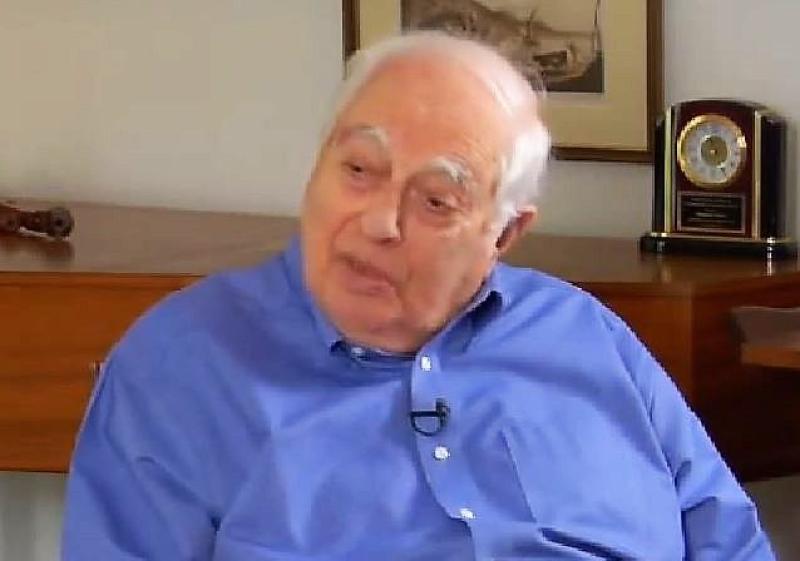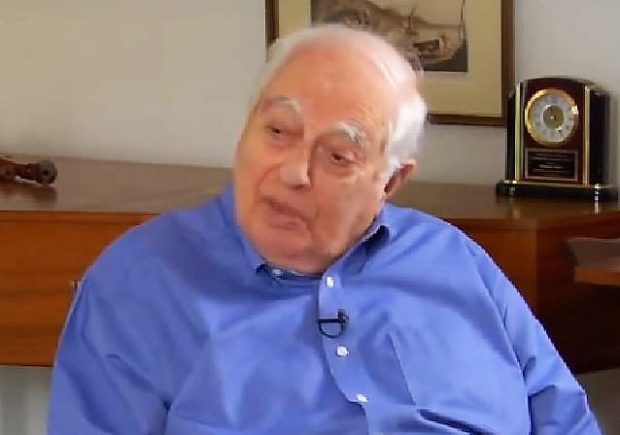Historian Bernard Lewis died yesterday at age 101.
The accolades are rolling in.
Jay Nordlinger tweeted :
Bernard Lewis was the dean of Middle East scholars — and one of the greatest scholars of our age. One of the most useful too, frankly. Like countless others, I learned a great deal from him. You might like to spend an hour in his company, via this video.
This 2006 profile at The Weekly Standard also provides good background, The Last Orientalist :
IT IS OFTEN SAID THAT the United States isn’t easy on its scholars and public intellectuals–that they are not accorded the prestige and respect that they are given in the Old World. This complaint, usually made by left-wingers struggling against the tide in the United States, isn’t totally without merit. A good literary scholar or classicist in the United States perhaps doesn’t quite have the same social cachet as would a similarly accomplished scholar at Oxford or the Sorbonne. But when scholars do make it in the United States–and there certainly seem to be vastly more European scholars hoping to make it in America than Americans trying to snag a sinecure in Europe–there is simply no comparison in the eminence, influence, and renown that they can achieve. Since arriving in the United States in 1974, the British historian of the Middle East Bernard Lewis has become one of America’s–and thus the world’s–most famous academics.
For those of us seriously interested in the Middle East–and since 9/11 that has become a rather large crowd–Lewis, who will celebrate his 90th birthday on May 31, has attained a stature in the field and with the general reading public unrivaled by any historian, living or dead, of the Middle East and Islam. His range of writings–from the pre-Islamic period, through Islam’s classical and medieval ages and its premodern “gunpowder” empires, to today’s Muslim nation-states–is simply unparalleled by any other scholar, even from the golden age of Islamic studies in the late 19th and early 20th centuries, when the field’s terrifyingly erudite, multilingual European founding fathers–the much despised “orientalists”–bestrode the earth. Lewis is the last and greatest of the orientalists–an awkward, geographically imprecise name for those who gave birth to the disciplined study of Islamic civilization. To borrow from Shiite Muslim legal scholarship, Bernard Lewis is the marja-e taqlid, “the source of emulation,” the scholar to whom on the great questions one must make reference. He has joined that elite group of academics–the economists Milton Friedman and John Kenneth Galbraith come to mind–who have decisively shaped public discourse, if not always government policy, on their subjects.
My own reading of Lewis’ work was rather limited, so I can’t express a personal view on where he fit in in the sweep of history. But there are two articles of his that made a difference to me, and still are required reading.
First is his 1990 article in The Atlantic, The Roots of Muslim Rage :
Islam is one of the world’s great religions. Let me be explicit about what I, as a historian of Islam who is not a Muslim, mean by that. Islam has brought comfort and peace of mind to countless millions of men and women. It has given dignity and meaning to drab and impoverished lives. It has taught people of different races to live in brotherhood and people of different creeds to live side by side in reasonable tolerance. It inspired a great civilization in which others besides Muslims lived creative and useful lives and which, by its achievement, enriched the whole world. But Islam, like other religions, has also known periods when it inspired in some of its followers a mood of hatred and violence. It is our misfortune that part, though by no means all or even most, of the Muslim world is now going through such a period, and that much, though again not all, of that hatred is directed against us….
In the classical Islamic view, to which many Muslims are beginning to return, the world and all mankind are divided into two: the House of Islam, where the Muslim law and faith prevail, and the rest, known as the House of Unbelief or the House of War, which it is the duty of Muslims ultimately to bring to Islam. But the greater part of the world is still outside Islam, and even inside the Islamic lands, according to the view of the Muslim radicals, the faith of Islam has been undermined and the law of Islam has been abrogated. The obligation of holy war therefore begins at home and continues abroad, against the same infidel enemy….
The movement nowadays called fundamentalism is not the only Islamic tradition. There are others, more tolerant, more open, that helped to inspire the great achievements of Islamic civilization in the past, and we may hope that these other traditions will in time prevail. But before this issue is decided there will be a hard struggle, in which we of the West can do little or nothing. Even the attempt might do harm, for these are issues that Muslims must decide among themselves. And in the meantime we must take great care on all sides to avoid the danger of a new era of religious wars, arising from the exacerbation of differences and the revival of ancient prejudices.
It’s no surprise that this historical and theocratic view of Islam made Lewis hated by western leftists and particularly Israel haters. Ben Norton, a member of the Max Blumenthal crowd, thus tweeted :
Orientalist Bernard Lewis shilled for US empire, helped sell murderous wars, advised neocons on how to better conquer the Middle East, and denied the Armenian Genocide.
Now, after contributing to wars that killed millions, the “eminent historian” is dead
More important to me than 1990 Atlantic article was Lewis’ 1976 article in Commentary, which John Podoretz correctly called a “landmark essay.”
I wrote about that article, The Return of Islam , in my January 2, 2016 post, “First the Saturday people, then the Sunday people”:
read more at https://legalinsurrection.com/2018/05/bernard-lewis-rip-first-the-saturday-people-then-the-sunday-people/#more-250307









But the portion of the Commentary article that motivated my post was this (emphasis added):
This analysis is as true today as it was in 1976, and in 1948 when, as historian Benny Morris has documented , the war against the creation of Israel was viewed as war of Jihad against the infidels occupying Muslim lands (emphasis added):
Lewis’ work is a key to understanding the obsessive Iranian hatred of Israel, as well as that from other Islamists supported by Iran, like Hezbollah and Hamas. It’s not about a few miles of territory here or there. But it’s not just a war against the Jews, it’s a war against Christians as well that is playing out in the Middle East in an ethnic cleansing of ancient Christian communities.
The western leftists who are equally obsessed against Israel supposedly on “occupation” or “human rights” grounds are part of the Jihad against the Jews and Christian whether they understand their role or not.
I ended my 2016 post as follows:
Dear Friend KPR: This article, the recently deceased (RIP) author is was written about and the content of his life's body of work are all noteworthy.
Outstanding contribution, my dear friend.
I hope it gets the objective read and attention it deserves.
These matters obviously do have real world consequences.
It is good for the News Talkers community to have you back and active with us again.
I hope this spring finds you and yours in the best of health and happiness.
Enoch.
Thank you, my friend, I am doing well. Trying to stay off social media it keeps me happier
it keeps me happier 
Here is something else you may find interesting, a recent academic paper that goes hand in hand with this article.
https://www.academia.edu/36651371/The_Privileged_Palestinian_Refugees_
"privilege" it comes in many forms.
kpr37 with a pagan's perspective.
Dear Friend KPR37: Thanks for the heads up.
Whenever you can stand it, we are the better off for your presence.
Peace and Abundant Blessings Always.
Enoch.
Experts are ignored, when their expertise is contrary to the presently desired overzealous PC and media-generated political stance.